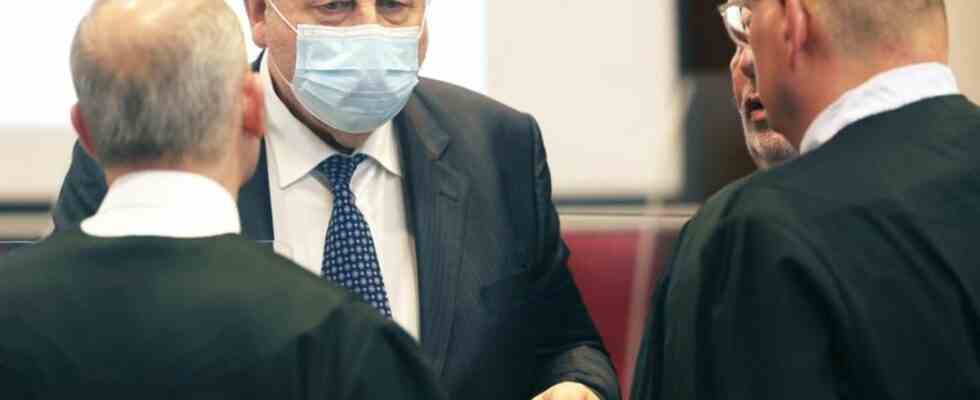crime
“Cum-Ex” suspect complains about prison conditions
Hanno Berger (M), defendant and lawyer, talks to his lawyers in the courtroom. Photo: Oliver Berg/dpa
© dpa-infocom GmbH
Z«Mr. Cum-Ex” Hanno Berger looks tired, the detention is affecting him. Two witnesses from an authority give an insight into the tax refund processes. This makes it clear that trust in banks was high at the time.
In the multi-billion dollar “Cum-Ex” tax scandal, the best-known protagonist of the stock deals, Hanno Berger, complained about the prison conditions in criminal proceedings.
Before the Bonn district court, the 71-year-old said on Thursday that it was “not necessarily humane if you were housed in a room that was largely moldy and dirty”. He gets “morning and evening untoasted bread with a slice” and no real lunch – only “watery soup” and “yesterday rice, babbled together with a little sauce on it”. He wants to defend himself against the allegations in court, but his strength is waning.
“I’m used to a lot and I’m not a troublemaker either, I rarely complain,” said Berger. He does not want to be treated better than others in prison. “I want to be treated equally, I don’t want any special sausages.”
Berger’s lawyer Richard Beyer said his client’s psychosocial situation was “extremely critical”. The fact that Berger was told in the Cologne-Ossendorf prison that he was only allowed to call his family twice a month for 20 minutes is questionable. The presiding judge Roland Zickler listened and said it should be “fair and humane”. “I’ll take care of it – care doesn’t mean that I can present a solution,” said the judge.
«Mastermind» of the deals
Berger is considered the architect and “mastermind” of the “cum-ex” deals, which peaked in 2006 and ended in 2012 with a change in the law. Banks, traders and investors pushed shares with («cum») and without («ex») dividend rights back and forth. There was confusion around the dividend record date, with the tax authorities losing track and refunding capital gains taxes that had not been paid at all. According to different estimates, the German tax authorities lost a two-digit billion amount.
In the Bonn proceedings, Berger is accused of three cases of particularly serious tax evasion. Among other things, he is said to have persuaded the Hamburg private bank MM Warburg to take up “cum-ex” transactions and helped to set up the necessary structures. The tax authorities are said to have suffered damage of 278 million euros (file number 62 KLs 2/20).
After the start of the trial on Monday, the second day of the trial followed on Thursday. The defense again declined to respond to the prosecution’s allegations and give their perspective. His admission will come later, said Berger.
At the start of the trial, he had two public defenders at his side, and on Thursday, Munich lawyer Beyer was added as a defender by choice. He had trouble keeping his client calm. But Berger kept speaking up. Eventually, the lawyer found it too much and emphatically asked for a break so that he could talk to his client alone. The judge agreed.
What the banks asked for was paid
Two employees of the Federal Tax Office in Bonn, which was responsible for tax refunds, were called as witnesses. The testimony of the witnesses made it clear that the refunds were automated in so-called collective procedures and that the office did not check the eligibility – what the banks had requested was paid. The banks had previously guaranteed in writing that the tax refund requested was legal. This written statement was sufficient – after that “the register was open”, as the judge remarked. You have to be able to rely on the banks, said one of the witnesses.
Didn’t anyone sit in the control center and say, “Oops, that’s a lot,” in view of the millions of euros in reimbursement, asked the judge. “There was no downstream verification process,” said the other witness – the reimbursement system had to process large amounts and it was “efficient”.
The testimonies made it clear that a letter from the Federal Ministry of Finance from May 2009, in which the problem of double tax refunds was pointed out, did not lead to a different way of working in the authority. The judge asked whether the letter had been explained in more detail internally, whether with handouts or training? “Not at all at this point,” said one of the witnesses, a former head of department at the Federal Tax Agency.

